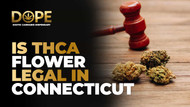Is THCA Flower Legal in Connecticut
Jun 17th 2025
Is THCA Flower Legal in Connecticut?
THCA flower has become an increasingly popular topic in the cannabis community, and many consumers wonder whether this non-psychoactive cannabis form is legal in Connecticut. Understanding the laws surrounding THCA flower is essential for those interested in exploring its potential benefits, especially given the evolving nature of cannabis regulations.
What is THCA Flower?
THCA (Tetrahydrocannabinolic Acid) is the non-psychoactive compound found in raw cannabis plants. Unlike THC, which is the active compound responsible for the "high" associated with marijuana use, THCA does not produce psychoactive effects. When cannabis is heated (through smoking, vaping, or cooking), THCA decarboxylates and turns into THC, the compound responsible for the effects most cannabis users seek. This process is what makes THCA an important part of cannabis’s overall composition.
THCA flower refers to raw cannabis buds that are high in THCA, and these buds are often sold for their purported health benefits, such as anti-inflammatory properties, without the mind-altering effects of THC. But, the legality of consuming THCA flower varies widely from state to state, especially considering its potential to convert into THC.
THCA Flower and Connecticut's Cannabis Laws
As of July 1, 2021, Connecticut legalized both medical and recreational cannabis for adults 21 and older, making it one of the states to embrace broader cannabis access. With this legislative shift, recreational cannabis use became fully legal, including for medical patients, who already had legal access to cannabis prior to 2021.
In Connecticut, THCA flower is legal for adults who are at least 21 years old. The state’s laws allow adults to possess and consume cannabis products, including THCA flower, as long as the products are obtained from licensed dispensaries.
Possession Limits and Cultivation Rules
Under Connecticut's recreational cannabis laws (effective January 10, 2023), adults aged 21 and over are permitted to purchase up to 1.5 ounces (42 grams) of cannabis, including THCA flower, per transaction. Additionally, those who wish to grow cannabis at home may cultivate up to three mature plants and three immature plants indoors. However, the total number of plants per household cannot exceed 12 plants. These plants must be secured and grown in a private, enclosed space, and access must be restricted to the grower only.
Where Can You Use THCA Flower in Connecticut?
While THCA flower is legal in Connecticut, there are strict rules on where it can be consumed. Smoking or vaping cannabis, including THCA flower, is prohibited in several public places. This includes state parks, beaches, on the water, and within 25 feet of entrances to buildings, such as workplaces and hotels. Additionally, local municipalities are allowed to regulate public cannabis use, and they can set aside specific areas where consumption is permitted.
It’s also important to note that property owners, landlords, and rental companies can choose to ban cannabis use on their premises. If you're living in a rental property or staying in a hotel, always confirm the policies regarding cannabis use to avoid fines or eviction.
The Legal Grey Area of THCA Flower
Although THCA itself is not psychoactive, its ability to convert into THC when heated presents certain challenges. Cannabis that contains high levels of THCA is still classified under Connecticut’s cannabis laws, and as long as it complies with state regulations (such as being sold through licensed dispensaries), it is considered legal.
However, THCA flower may still face scrutiny in states or jurisdictions where cannabis is not legal. Federal law also still classifies cannabis, including THCA flower, as a controlled substance under the Controlled Substances Act. This means that while you may legally purchase and possess THCA flower in Connecticut, transporting it across state lines could expose you to legal risk, especially in states where cannabis is still illegal.
Is THCA Flower Legal Outside of Connecticut?
While THCA flower is legal in Connecticut, it may not be legal outside of the state. Cannabis laws vary significantly by state, and each state has its own set of rules for cannabis products, including THCA flower. In states where cannabis is illegal, even possessing THCA flower could lead to legal complications. Moreover, interstate transportation of cannabis products is still prohibited by federal law, so it is crucial to be aware of the laws in the specific state you are traveling to if you plan to take THCA flower with you.
Consumer Safety and Legal Advice
As with all cannabis products, it is essential to consume responsibly and stay informed about the legal landscape. Connecticut’s cannabis laws emphasize consumer safety, and it is strongly advised not to operate vehicles or heavy machinery under the influence of cannabis. Cannabis can impair coordination, concentration, and judgment, and consuming it irresponsibly can lead to dangerous situations.
Before purchasing or consuming THCA flower, always ensure that you are buying from a licensed dispensary in Connecticut. Cannabis products sold through licensed sources are subject to quality control, ensuring they meet safety and testing standards. Illegally obtained cannabis can pose health risks due to contaminants and unregulated production processes.
Conclusion
THCA flower is legal in Connecticut for adults aged 21 and older, provided it is purchased from licensed dispensaries. The state’s comprehensive cannabis laws, including specific possession limits, cultivation rules, and usage restrictions, help ensure that consumers have access to safe, regulated cannabis products. However, keep in mind that while THCA flower is legal within the state, the federal government and other states may have different regulations. Always stay updated on the laws, consume responsibly, and make sure to follow local and state guidelines to avoid legal complications.

